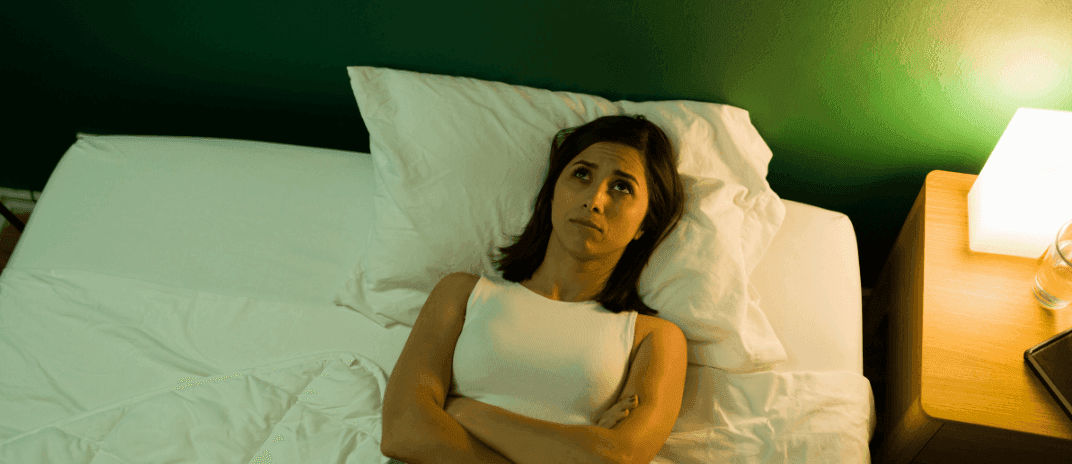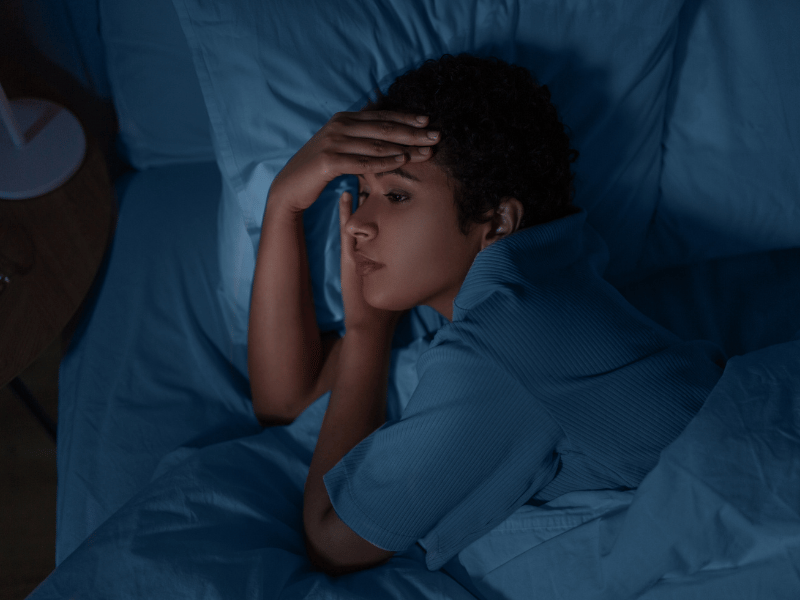


Do you tend to wake up frequently at night? According to statistics, as much as 30% of adults experience trouble falling asleep and staying asleep at night [1]. If you’re one of them, you may be looking for a solution that can help you go back to sleep when that happens.
In this article, we’ll look at why you may be waking up frequently at night, and how to go back to sleep by practicing good sleep hygiene.

No one likes waking up in the middle of the night. It can feel exhausting and frustrating, especially when you are spending more than 10 minutes trying to fall back asleep.
If you’re waking up multiple times throughout the night, it could be a sign of a sleep disorder such as sleep apnea or nocturia. In some cases, it could be due to your body’s natural circadian rhythm, sleep chronotype, or external factors such as your sleep environment or stress [2].
Knowing the reason why you are waking up often at night can help you to make adjustments so that it doesn’t happen.
Checking the time upon waking is one of the most common mistakes made that prevents people from falling back to sleep. Doing so can increase stress or anxiety levels as there is now an anticipation of having to start your day in a few hours.
Additionally, the blue light that is emitted from your phone can affect your body’s ability to produce melatonin to help you fall asleep [3].
For those who experience trouble falling asleep after waking up abruptly at night, here are some sleep habits and techniques that you may incorporate to fall back asleep.
One way to help you fall asleep faster at night is by creating a sleep-conducive environment. An environment that is cool, dark, and quiet can help to improve sleep [4].
You can create a comfortable sleep environment by opting for curtains that block out light, using earplugs or a white noise machine to block out noise, keeping bedroom temperature cool, and using comfortable bedding and pillows can help elevate your sleep experience.

An important thing that you should avoid doing when you happen to wake up is to check the time on your phone or alarm clock. This will only increase your stress and anxiety.
A general rule of thumb is that if you don’t hear your alarm, it’s probably a good sign that you are not supposed to wake up just yet. So, close your eyes, get comfortable and drift off to sleep once again.
Deep breathing exercises can potentially help you to fall asleep faster, according to various studies. For instance, a study that involved participants using diaphragmatic breathing relaxation training (DBRT), found that participants managed to slow their breaths and get into a relaxed state. This, in turn, helped them to achieve better sleep at night [5].
This is something to try if you struggle to sleep. All you need are a few deep breaths at a time!
Another technique you want to incorporate for better sleep overall is progressive muscle relaxation. Progressive muscle relaxation is a technique that slowly tensing and relaxing your muscles. You can either start from the top of your head all the way down to your feet or vice versa.
This technique focuses on bringing awareness to the body and the muscles that we may not realize we could be tensing. Practicing progressive muscle relaxation will help to train our body to relax and respond to stress differently [6].

Listening to soothing music or white noise to sleep is also one way to help you get comfortable until you feel sleepy enough to fall back asleep. It can help to mask out disruptive noises from your surrounding environment, facilitating sleep.
You can either use a sound machine or opt to use a sleep app such as ShutEye®. ShutEye offers a curated collection of over 100+ sleep sounds, ranging from white noise, calming ocean sounds to relaxing soundtracks. Try it today for FREE!

Guided sleep meditations are useful in helping to calm your mind and body down. Meditation encourages relaxation by shifting your focus away from racing thoughts and onto your breath, a soothing voice, or calming imagery.
It activates the parasympathetic nervous system, lowering stress hormones such that you feel less stressed [7]. It also encourages deep relaxation for your physical and mental well-being.

You may also try journaling. Journaling can help you to unwind, and redirect your mind from those anxious or stressful thoughts. When your mind is empty and less anxious, you’ll be able to sleep better at night.
By incorporating these 7 effective techniques into your daily routine, you may find yourself being able to sleep better at night and experience less frequent awakenings. It’s important to be patient and consistent as it takes time for your sleep habits to improve.
One solution to help you get restful sleep and avoid sleep disruption is through the use of ShutEye® app.ShutEye is an advanced sleep-tracking app that monitors and analyzes your sleep patterns, recommending expert tips to help you improve it. Download now for FREE!
Liu, Y. (2020) The effectiveness of diaphragmatic breathing relaxation training for improving sleep quality among nursing staff during the COVID-19 outbreak: A before and after study. Sleep Medicine, 78, 8 [online]. Available at: https://doi.org/10.1016/j.sleep.2020.12.003
Marshall, S. (2025) Sleep Statistics [online]. Available at: https://www.helpguide.org/wellness/sleep/sleep-statistics
Nacioli, T. (2024) Why do I wake up at 3 a.m. every night? [online]. Available at: https://edition.cnn.com/2024/03/12/health/wake-up-middle-of-night-sleep-architecture-wellness/index.html
National Institute for Occupational Safety and Health (2020) NIOSH Training for Nurses on Shift Work and Long Work Hours [online]. Available at: https://www.cdc.gov/niosh/work-hour-training-for-nurses/longhours/mod6/03.html
Rudy, M. (2023) Can’t fall back to sleep after waking up in the middle of the night? Here’s what experts recommend [online]. Available at: https://nypost.com/2023/12/09/health/cant-fall-back-to-sleep-after-waking-up-in-the-middle-of-the-night-heres-what-experts-recommend/
Solan, M. (2023) Try this: Progressive muscle relaxation for sleep [online]. Available at: https://www.health.harvard.edu/staying-healthy/try-this-progressive-muscle-relaxation-for-sleep
University of Utah (n.d.) How Does It Work? [online]. Available at: https://medicine.utah.edu/students/wellness/what-is-wellness/mindful-meditation/how-does-it-work